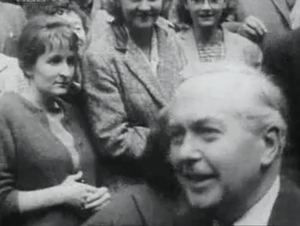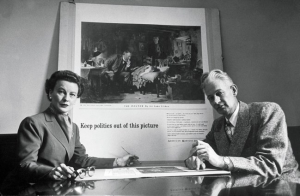Political PR
Independent Television News (ITN) were the first UK broadcaster to actually cover the election campaign itself. In 1958. “Granada Television (part of the ITV network) broke the taboo by covering in broadcast reports and debates the Rochdale By-Election” (Webb, n.d.)
They followed politicians, for the first time, as they spoke to the electorate on the ground. This was seen as a breach of more legislation that dis-empowered the media in the UK; The Representation of the People Act. Conversely the BBC’s coverage was virtually nil. With a self-imposed moratorium on election coverage in the three weeks leading up to the election.
After all of this, prospective Prime Minister Harold Wilson started to use television and therefore PR to manage his own image. Everything about his public persona was tweaked and managed. From his public speaking style to the use of his tobacco pipe as a means to engage with the electorate as a homely trustworthy person.

His delivery was diametrically opposed to the incumbent Prime Minister’s traditional image of Head teacher or Army General. He achieved this sleight-of-hand even though he was “a former Oxford don, Wilson brilliantly concealed his learning, if not his intelligence, behind his Gannex mac, his pipe and his Yorkshire accent.” (Moore, 2013)
Politicians in the 1964 election were now subjected to an unencumbered media. Who were basking in the removal of restrictions. However, the BBC did not take advantage of this freedom and declined to air some forthright views on race that were prevalent at that time.
Following the creation of the first Political PR company Campaigns Inc in 1933 California USA, or as Upton Sinclair a failed US politician put it: “The Lie Factory”.

Politicians around the globe have been learning lessons from industrial public relations consultancies. Namely, trying to gain free media exposure by realising that news outlets are hungry for stories. Nick Davies in Flat Earth News makes the point that PR can easily get through the journalism fact checking system. And be published unchallenged: “I spoke to PR specialists that told me they had even seen their press releases running more or less verbatim” (Davies, 2008, p. 91).
Telling stories, spinning yarns and otherwise communicating precisely crafted messages is now taking hold as a fully-fledged career. Now working in public relations and being a “Spin Doctor” a very attractive career option. Including advertising and PR “The UK PR and communications industry was worth £12.9bn in 2016” (Prca.org.uk, 2018). And spending on PR alone in Europe is expected to “reach 2.9 billion U.S. dollars in 2018” (Statista, 2018). These are not inconsiderable sums.
Is it little wonder that even newspapers are running stories regarding how to become a journalist’s sometime nemesis.
The Guardian newspaper even published a quiz aimed at finding out if your mettle was strong enough to be a spin doctor with questions such as “a newspaper is about to publish a leaked document describing the prime minister as ‘obsessive’ and ‘a control freak’. What do you do?” (Theguardian.com, 2011).
So, it seems that the PR guru, spin doctor or political lobbyist is here to stay. Politicians now need to not only heed their constituents, party lines and polices but also manage their persona, message and political trajectory. Luckily, there’s a PR guru for that.
References
Davies, N. (2008). Flat Earth news. London: Chatto & Windus, p.91.
Davis, A. (2007). The mediation of power. 1st ed. New York: Routledge, p.123.
Lepore, J. (2012). The Lie Factory | The New Yorker. [online] Newyorker.com. Available at: https://www.newyorker.com/magazine/2012/09/24/the-lie-factory [Accessed 12 May 2018].
Martin, G. (2018). ‘Spin doctor’ – the meaning and origin of this phrase. [online] www.phrases.org.uk. Available at: https://www.phrases.org.uk/meanings/spin-doctor.html [Accessed 13 May 2018].
Moore, C. (2013). Harold Wilson Night: the PM who lived and died by television. [online] Telegraph.co.uk. Available at: https://www.telegraph.co.uk/culture/tvandradio/9876437/Harold-Wilson-Night-the-PM-who-lived-and-died-by-television.html [Accessed 12 May 2018].
parliament.uk. (1956). BROADCASTING (SUSPENSION OF 14-DAY RULE) (Hansard, 18 December 1956). [online] Available at: https://api.parliament.uk/historic-hansard/commons/1956/dec/18/broadcasting-suspension-of-14-day-rule [Accessed 12 May 2018].
Prca.org.uk. (2018). The value and size of the PR industry | PRCA. [online] Available at: https://www.prca.org.uk/insights/about-pr-industry/value-and-size-pr-industry [Accessed 12 May 2018].
Statista. (2018). Public relations spending in Europe 2007-2018 | Statistic. [online] Available at: https://www.statista.com/statistics/448684/expenditure-of-public-relations-in-europe/ [Accessed 12 May 2018].
Theguardian.com. (2011). Could you be a spin doctor? | Quiz | guardian.co.uk. [online] Available at: https://www.theguardian.com/quiz/questions/0,5961,339317,00.html [Accessed 12 May 2018].
UK Parliament. (2018). Lobby journalism. [online] Available at: https://www.parliament.uk/about/living-heritage/evolutionofparliament/parliamentwork/communicating/overview/lobbyjournalism/ [Accessed 12 May 2018].
Webb, A. (n.d.). BBC – – History of the BBC. [online] BBC.co.uk. Available at: http://www.bbc.co.uk/historyofthebbc/elections/invention-2?lang=gd [Accessed 12 May 2018].
www.statista.com. (2018). Topic: Public relations. [online] Available at: https://www.statista.com/topics/3521/public-relations/ [Accessed 12 May 2018].
